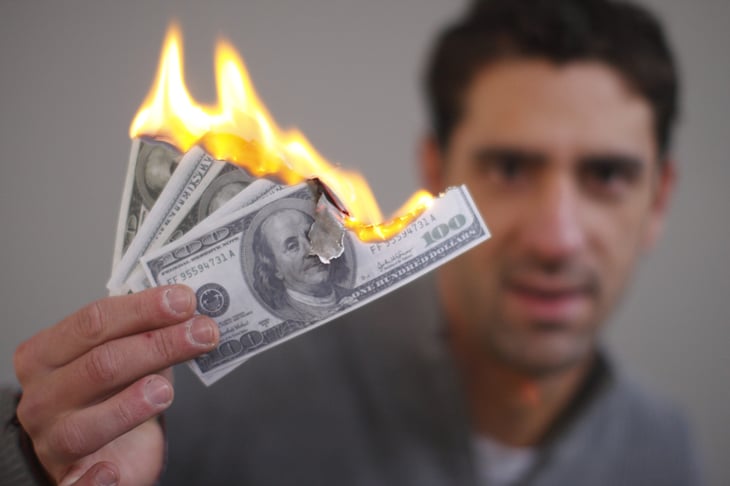
Most of us love to spend money. But deep down, we also realize that it’s often not a good idea, especially if we are trying to build massive wealth or even a small retirement nest egg.
So, we find endless ways to justify our foolish spending.
In the end, these rationalizations do us no favors. If you want to plug the holes in your budget so you can begin to accumulate real savings, remain on guard to fight back against these dumb ways that we convince ourselves to spend.
1. Using ‘girl math’

Recently, there has been a trend of rationalizing spending by using what is known pejoratively as “girl math,” especially on social media.
This self-deception focuses on breaking down the price of an item per use or per wear. For example, if you purchase an expensive handbag, the cost won’t seem so bad if you calculate it based on the number of times you will use the handbag. This “logic” helps some people justify such purchases.
However, no matter how you break down the cost, a purse with a high price tag remains an expensive — and wallet-depleting — luxury. No amount of TikTok videos that try to justify your spending will change that reality.
2. Spending ‘found money’

One of the oldest ways to justify overspending is to buy something “on sale.” Of course, purchasing any item — even at a discount — still costs you money, an inconvenient truth we’re only too happy to overlook.
More recently, people have taken the notion of shopping sales as a way to “save” money a step further: The “savings” have now been reimagined as “found money.”
It works like this: If you buy a $10 item when it is on sale for 50% off, you have pocketed $5 in “found money.” In essence, you view the money you just “saved” as if you found a $5 bill in the parking lot. This sort of reframe makes it much easier to justify using the $5 “windfall” to purchase something else.
Of course, you could take the $5 in “savings” and put it away for a rainy day. But that’s so 20th century.
3. Indulging in ‘treat’ culture

You work hard for your money: Shouldn’t you treat yourself once in a while as a way to reward your efforts?
Perhaps. The concept is certainly nothing new. For a long time, hard-working folks have been using “treat” culture to justify their purchases of daily lattes or even the occasional spa treatment.
Some folks view such relatively small purchases as harmless fun. Writing for The Conversation, Kokho Jason Sit, senior lecturer in marketing at the University of Portsmouth in England, opines:
“But treat culture, I believe, is a low-risk way to experience a morsel of happiness in dark times.”
If you agree, just remember that it is easy to go broke if you “treat” yourself every time life gets a little difficult or a passing cloud darkens your mood a bit.
Historically, many folks — perhaps the majority of us — have regularly “treated” ourselves into an endless cycle of ever-growing credit card debt that quickly destroys any hope of building wealth.
4. Hiding purchases by paying cash

One of the sneakiest ways we justify our unjustifiable spending is to use cash to pay for our purchases.
Researchers at the University of Notre Dame and Stanford University discovered that we tend to pull dollar bills from our wallet to pay for items that we know are wasteful.
In a summary of the findings, Christopher Bechler, assistant professor of marketing at Notre Dame, says:
“When a purchase is difficult to justify — like buying an overpriced bottle of water at the airport, cigarettes or candy — consumers pay with less-trackable methods, like cash, so they can eliminate the paper or electronic trail and ‘forget’ this guilty purchase.”
On the other hand, when the purchase is easy to justify, we have no problem whipping out a credit card or using another trackable form of payment.
5. Overspending on special occasions

It’s easy to justify overspending on special occasions. After all, Christmas only arrives once a year.
However, this viewpoint becomes a problem when one thinks of the many “special occasions” that arise throughout the year, including holidays, birthdays and other special events.
Given all of these noteworthy occasions, it is easy to let overspending accumulate over the course of a year.
Writing in Psychology Today, Shahram Heshmat — an associate professor emeritus at the University of Illinois at Springfield who specializes in the health economics of addiction and obesity — offers the following advice:
“Failure to incorporate an exceptional purchase into our budget as one in a series of special purchases can encourage overspending. You can budget for infrequent expenses by creating special savings accounts earmarked specifically, say, for birthdays.”
6. Buying things to claim as tax deductions

If you itemize deductions on your tax return — or if you claim expenses as part of a small business or side hustle — you might be inclined to purchase specific items in the name of reducing your tax bill.
Tax deductions can indeed reduce the amount of tax you owe. But purchasing something simply because it qualifies for a deduction is likely to cost you money. That is because a tax deduction only reduces the amount of your income that is subject to tax. Contrary to popular belief, it does not give you a dollar-for-dollar reduction in your tax liability like a tax credit does.
Say you purchase a new $500 laptop that you plan to use as part of a side hustle. If your tax rate is 15%, deducting the expense of the computer from your taxes will save you $75. That means you will still be $425 poorer than you would have been if you never bought the computer.
By all means, buy the computer if you need it for your business. But it is foolish to buy things simply to reduce your tax bill and think you have saved money in the process.





Add a Comment
Our Policy: We welcome relevant and respectful comments in order to foster healthy and informative discussions. All other comments may be removed. Comments with links are automatically held for moderation.